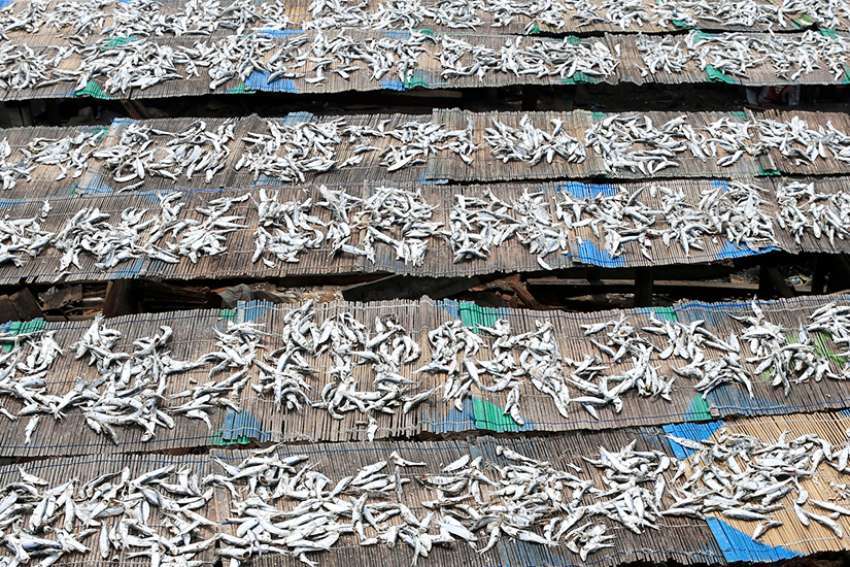According to an Aug. 31 report from a Buffalo-led research team, 10 species of fish in the Niagara River are showing high concentrations of human antidepressant drugs in their brain tissues.
CNS photo/Adi Weda, EPA
Comment: Our environmental abuse puts us on a road to ruin
By Cathy Majtenyi, Guest Columnist
The August and September hurricanes of Harvey, Irma and Jose drowned out two fleeting news items that should keep us awake at night with anguish about how we’re treating our planet.
The first was: Fish on Prozac. Then came: A full 50 per cent of Canada’s wildlife is possibly going the way of the dodo bird.
Starting with the fish, a University at Buffalo-led research team reported Aug. 31 that 10 species of fish in the Niagara River are showing high concentrations of human antidepressant drugs in their brain tissues. How did this happen? The active ingredients in these types of drugs, which increased in use by 65 per cent between 1999 and 2014 according to U.S. data, enter the water system through urine.
News item No. 2 is even more distressing. On Sept. 14, World Wildlife Fund-Canada released its Living Planet Canada Report, which shows a decline of 50 per cent of the 903 mammal, bird, reptile, amphibian and fish species monitored in Canada from 1970 to 2014. The report concludes that this decline is being driven by six factors — habitat loss, climate change, pollution, invasive species, overfishing and cascading effects.
What is the connection between fish on Prozac and Canada’s disappearing wildlife? These are two results of what Pope Francis refers to as our “complacency and a cheerful recklessness” in our ecological approach to how we relate to God’s natural environment.
In his encyclical Laudato Si’, Pope Francis points to a pervasive denial of how unmitigated materialism destroys our natural en-vironment. “We are tempted to think that what is happening is not entirely clear,” he writes, and we conclude “things do not look that serious.”
But this willful “evasiveness,” he says, allows us to continue with business-as-usual “self-destructive vices: trying not to see them, trying not to acknowledge them, delaying the important decisions and pretending that nothing will happen.”
University at Buffalo lead scientist Diana Aga explains that we build water treatment facilities that focus only on killing disease-causing bacteria and extracting solid matter while ignoring many other chemicals that harm our environment. “As a result, wildlife is exposed to all of these chemicals,” she says in a university release. “Fish are receiving this cocktail of (antidepressant) drugs 24 hours a day, and we are now finding these drugs in their brains.”
The release points out that human health is not at risk, but fish are not so lucky. Aga says “other research teams have shown that antidepressants can affect the feeding behaviour of fish or their survival instincts. Some fish won’t acknowledge the presence of predators as much.”
At issue is society’s failure to put into place, or abide by, policies and programs that limit urban sprawl, resource extraction and the amount of poison we pump into our air and water. Canadian wildlife is far from our sight, so it becomes easy to put wildlife out of our minds as we use up land and resources in quests to buy the latest gizmo or build yet another suburb.
The decline and poisoning of our wildlife is a tragedy and, indeed, leads to our own physical and spiritual ruin. Numbers 35:33-34 very strongly prohibits us from defiling and polluting the land. Revelation 11:18 talks about the destruction of those who destroy the Earth. Our denial is bad enough, but some people justify environmental irresponsibility through a gross misinterpretation of Genesis 1:26, specifically the part about us having “dominion” over the Earth.
To understand that verse in its full context, 'Laudato Si' directs us to Genesis 2:15, where God puts Adam “in the Garden of Eden to work it and take care of it.” Ploughing, tilling and cultivating are all part of working, while “take care” involves protecting, preserving and overseeing God’s resources, says the encyclical.
The missing link in our heads and hearts is accountability to God for how we as individuals, and collectively as a society, use the environment. It’s kind of like going to a hotel and leaving the lights on while you’re out because utilities are included in the price of the hotel room. It’s a very different story in your own dwelling, where you pay the hydro bill.
If we focus on the cost that we personally have to pay for our environmental abuse — giving an account to God on Judgment Day, seeing our children and grandchildren struggle with the worsening impacts of climate change, not being able to hike in the outdoors — then perhaps we would become good stewards of God’s creation, of which we are only a small part.
(Majtenyi is a researcher and communications specialist at Brock University in St. Catharines, Ont.)
Please support The Catholic Register
Unlike many media companies, The Catholic Register has never charged readers for access to the news and information on our website. We want to keep our award-winning journalism as widely available as possible. But we need your help.
For more than 125 years, The Register has been a trusted source of faith-based journalism. By making even a small donation you help ensure our future as an important voice in the Catholic Church. If you support the mission of Catholic journalism, please donate today. Thank you.
DONATE

